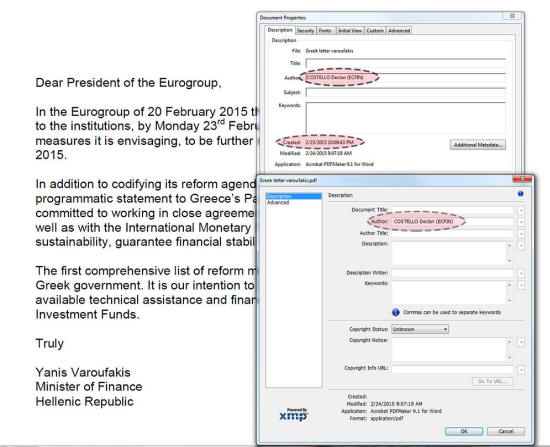|

by Tyler Durden
February 24, 2015
from
ZeroHedge Website
Spanish version
As we noted earlier today, there was
some confusion over the plight of the Greek reform proposal
document, which initially was said to have been delayed until today,
only for the Troika (the EU, the ECB, and
the IMF), pardon..., Institutions, to flip around and say
they had actually received it before midnight on Monday.
How could the two be possible?
Courtesy of
Yannis Koutsomitis, who had the
simple but profound idea of looking at the properties tab in the
leaked Varoufakis draft of the agreed to proposals, we now know.
As it turns out, the reason why
not only the Troika received an agreed to version of the
Greek reform proposals "before midnight on Monday", but rushed these
through with a favorable agreement today, is that, drumroll,
the European
Commission drafted the entire letter!

All
Yanis Varoufakis had to do was agree
to the letter that the Troika had previously written and agreed in
advance was agreeable to it, and send it back. The skeptics are
encouraged to play around the original PDF "leak"
found here.
As for the actual author of the "Greek"
reform package, a document which was created at 10:09 pm on Monday,
February 23, 2015 (so technically, yes, before midnight on Monday)
was one Declan Costello of the European Commission.
Who is Declan?
Here is his bio
courtesy of
the CEPR's Policy Portal, VOX:
Declan
Costello
 Declan Costello is an Economist
working in the Directorate General for Economic and Financial
Affairs of the European Commission since 1991. Declan Costello is an Economist
working in the Directorate General for Economic and Financial
Affairs of the European Commission since 1991.
Currently he is Head of Unit in the department responsible for
the 'Coordination of Structural Reforms and of the Economic
Service,' which is involved in developing the economic framework
for analyzing progress with structural reforms at EU and Member
State level towards raising growth potential (the so-called
Lisbon strategy), and developing EU policies in response to the
economic crisis.
Prior to this, he was Head of Unit
dealing with economic analysis of labour markets and social
welfare systems, where he coordinated a project to make
projections on the economic and budgetary impact of ageing
populations for EU Member States.
He has a degree in economics from
Trinity College Dublin and a Masters degree for the College of
Europe, Bruges.
Representing the European
Commission, Mr. Costello is also an alternate member of the
Economic Policy Committee (EPC) which advises and prepares
the EU's Council of Economics and Finance Ministers (ECOFIN).
But the biggest joke in all this?
As the
FT's Peter Spiegel
revealed, the IMF, which is an integral part
of the Institutional Troika, now pretends to not be on
board with the very letter it helped draft (and one doesn't need to
believe the PDF story above for that: after all all parties have
said they cooperated over the weekend when drafting the final
version of the letter) just to give the process some aura of
'legitimacy':
Letter by IMF Managing Director
Christine Lagarde to the President of the Euro Group on Greece
Press Release No. 15/71
February 23, 2015
The Honorable Jeroen Dijsselbloem
President of the Eurogroup
Finance Minister
Kingdom of the Netherlands
Dear Jeroen,
My Staff has reviewed the list of measures that the Greek
authorities prepared over the weekend. We think that it covers
the broad topics that should be on the new Government’s agenda.
In view of this, we would certainly
be able to support the conclusion that the list “is sufficiently
comprehensive to be a valid starting point for a successful
conclusion of the review,” as called for by the Euro Group at
its last meeting. But a determination in this regard should of
course rest primarily on an assessment by Member States
themselves and by the relevant European institutions.
While the authorities’ list is comprehensive, it is generally
not very specific, which is perhaps to be expected considering
that the government is new in office.
In some areas, like combating tax
evasion and corruption, I am encouraged with what appears to be
a stronger resolve on the part of the new authorities in Athens,
and we look forward to learn more about their plans. In quite a
few areas, however, including perhaps the most important ones,
the letter is not conveying clear assurances that the Government
intends to undertake the reforms envisaged in the Memorandum on
Economic and Financial Policies.
We note in particular that there are
neither clear commitments to design and implement the envisaged
comprehensive pension and VAT policy reforms, nor unequivocal
undertakings to continue already-agreed policies for opening up
closed sectors, for administrative reforms, for privatization,
and for labor market reforms.
As you know, we consider such
commitments and undertakings to be critical for Greece’s ability
to meet the basic objectives of its Fund-supported program,
which is why these are the areas subject to most of the
structural benchmarks agreed with the Fund.
Thus, it is important for me to
emphasize that for the discussions on a completion of the review
to be successful they cannot be confined within the policy
perimeters outlined in the Government’s list.
My Staff and I look forward to working with the new Government
on finding common ground, with the aim of concluding the 6th
review of the Fund-supported program as soon as possible.
Thank you for all your efforts to get us to this point.
With best regards,
Christine Lagarde
Managing Director
International Monetary Fund
Source
Dow Jones adds:
-
GREEK LIST FAILS TO MAKE CLEAR
ASSURANCES ON PENSION, VAT OVERHAULS, LIBERALIZING CLOSED
SECTORS - IMF'S LAGARDE
-
IMF'S LAGARDE: GREEK OVERHAUL
PROPOSALS 'GENERALLY NOT VERY SPECIFIC'
-
IMF'S LAGARDE: GREEK PROPOSALS A
GOOD STARTING POINT
-
IMF'S LAGARDE: GREEK PROPOSALS
FAIL TO GIVE ASSURANCES ON IMPORTANT BAILOUT REFORMS
-
IMF'S LAGARDE: CURRENT GREEK
BAILOUT PROPOSALS INSUFFICIENT TO RELEASE FUND CASH
-
EU FIN MINS CALL ON GREEK
AUTHORITIES TO "FURTHER DEVELOP" AND "BROADEN" LIST OF
REFORM MEASURES
Because the tragicomedy must go on!
|


 Declan Costello is an Economist
working in the Directorate General for Economic and Financial
Affairs of the European Commission since 1991.
Declan Costello is an Economist
working in the Directorate General for Economic and Financial
Affairs of the European Commission since 1991.